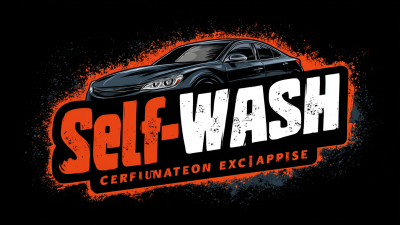5 Essential Tips to Optimize Your Machine Car Wash Business for Global Buyers
In an increasingly competitive automotive service industry, the effectiveness and appeal of your Machine Car Wash can significantly influence customer acquisition and retention, particularly in the global marketplace. According to a report by IBISWorld, the car wash industry in the United States alone is projected to generate over over $11 billion in revenue by 2024, highlighting the immense potential for businesses equipped with advanced washing technology. Moreover, with consumers becoming more environmentally conscious, machine car washes that incorporate eco-friendly solutions can attract sustainability-oriented buyers. By optimizing operational efficiency and enhancing customer experience, Machine Car Wash businesses can capitalize on this boom and distinguish themselves from traditional car washing methods. In this blog post, we will explore five essential tips to optimize your Machine Car Wash business specifically targeting global buyers, ensuring your services align with international standards and customer expectations.

Understanding the Global Market for Machine Car Wash Systems
The global market for machine car wash systems is rapidly evolving, driven by advancements in technology and shifting consumer preferences. As more people prioritize convenience and efficiency, the demand for automated car washes has surged. Understanding regional differences in customer expectations is crucial for businesses aiming to thrive in this competitive landscape. For instance, markets in urban areas may lean towards high-speed, compact systems that cater to a quick turnaround, while customers in suburban regions might appreciate more comprehensive cleaning options that emphasize quality over speed.
To capture the attention of global buyers, it is essential to stay attuned to emerging trends and innovations within the industry. Sustainable practices, such as water recycling systems and biodegradable cleaning solutions, are becoming increasingly vital as environmental concerns rise. Investors and customers alike are looking for solutions that not only enhance the performance of car washes but also align with eco-friendly values. By positioning your machine car wash business with these insights in mind, you can effectively attract a broader clientele and establish a robust presence in international markets.

Key Features International Buyers Look for in Car Wash Equipment
When it comes to selling car wash equipment to international buyers, understanding their specific needs is crucial. One key feature that these buyers often seek is durability. Equipment that can withstand diverse weather conditions and heavy usage will stand out in global markets. Buyers are likely to consider the quality of materials and the manufacturer's reputation for longevity, so presenting testimonials and case studies showcasing endurance can significantly influence their decision.
Another vital aspect is the efficiency of the car wash system. International buyers are increasingly looking for equipment that minimizes water and electricity usage while maximizing cleaning effectiveness. Highlighting innovations such as water recycling systems and energy-efficient motors can create a competitive edge. Moreover, ease of maintenance is essential; buyers prefer user-friendly designs that simplify upkeep and reduce downtime. By focusing on these key features, businesses can better align their offerings with the expectations of international buyers, enhancing their appeal in a crowded marketplace.
Effective Marketing Strategies to Attract Global Customers
In today's competitive landscape, utilizing effective marketing strategies is crucial for attracting global customers to your machine car wash business. According to a report by IBISWorld, the global car wash industry is projected to reach $36 billion by 2025, highlighting the immense opportunity for growth in this sector. To tap into this market, utilizing digital marketing platforms such as social media and search engine optimization (SEO) can significantly enhance your visibility. Engaging content that speaks directly to your audience's needs and preferences can help build brand loyalty and attract new customers.

Moreover, a survey by Statista found that 70% of consumers prefer businesses that have a strong online presence. This means that your machine car wash must not only have a user-friendly website but also leverage online advertising to reach broader audiences. Implementing targeted online ads tailored to specific demographics can yield a higher return on investment. Additionally, collaborating with influencers in the automotive or eco-friendly community can further amplify your reach, making your service appealing to environmentally-conscious consumers looking for convenient car cleaning solutions. Prioritizing these marketing strategies will position your business favorably in the ever-evolving global market.
Navigating Compliance and Regulations for International Trade
Navigating the complexities of compliance and regulations is crucial for any machine car wash business aiming for international trade. Different countries have varying legal requirements, environmental regulations, and safety standards that can significantly impact your operations. To successfully penetrate global markets, it is essential to conduct thorough research on the regulatory frameworks of the target countries. This entails understanding the specific certifications required for your machinery, chemical use, and waste disposal practices.
Moreover, engaging with local legal experts can be invaluable. They can provide insight into the nuances of compliance, helping you to avoid potential pitfalls that could delay your entry into key markets. Developing a strong compliance strategy will not only mitigate risks but also enhance your brand's reputation internationally. Being proactive in addressing regulatory concerns illustrates your commitment to quality and safety, which can be a strong selling point to global buyers.
Building Strong Relationships with Global Supply Chain Partners
Building strong relationships with global supply chain partners is paramount for any machine car wash business looking to capture international buyers. One effective approach is to invest in establishing strategic partnerships that facilitate information sharing and enhance supply chain flexibility. High-quality, multi-directional relationships can significantly aid in mitigating supply risks, ensuring that your operations can withstand disruptions commonly faced in the global supply chain landscape.
Additionally, cultivating resilience within your supply chain is crucial. This can be achieved by implementing strategies that allow for rapid adaptation to changes in demand and unexpected challenges. For example, regularly reviewing and optimizing your supply chain practices can help keep costs down and improve operational efficiency. Engage with suppliers not just as vendors but as collaborative partners, fostering an environment where innovation and support can thrive. By focusing on these essential aspects, you'll enhance your business's appeal to global buyers, setting the stage for sustainable growth in a competitive market.
Global Market Trends for Machine Car Wash Services
Related Posts
-

Unmatched Quality: China’s Top Drive Through Car Wash Machines for Global Buyers
-

Ultimate Guide to Choosing the Best Automatic Car Wash Equipment for Your Business
-

Essential Guide to Choosing the Best Automatic Home Car Wash System for Your Needs
-

Navigating Industry Standards and Challenges in the Best Car Wash Machine Production
-

How to Navigate Import and Export Certifications for the Best Self Wash Car Wash Equipment
-

How to Select the Best Self Car Wash Machine: Essential Tips for Global Buyers